Suzanne Vega - Interview
by Lisa Torem
published: 15 / 1 / 2014
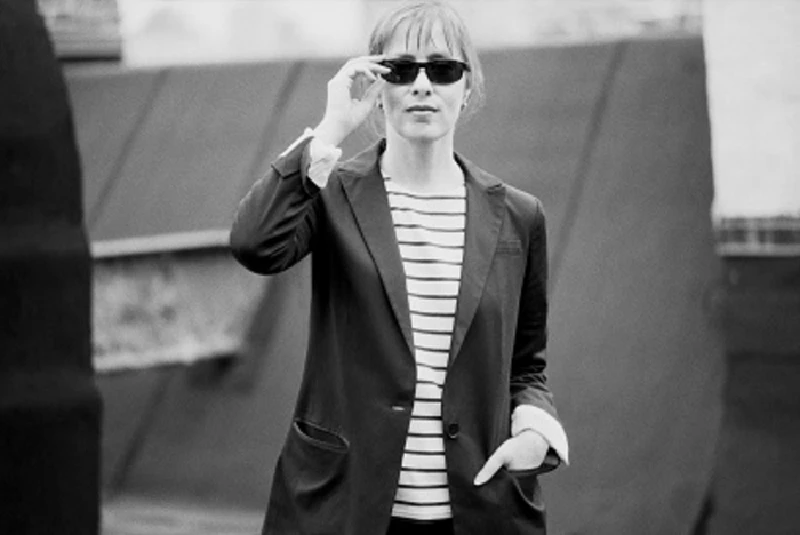
intro
Lisa Torem speaks to Suzanne Vega about her new album 'In The Realm of the Queen of Pentacles' and current 'I Never Wear White' tour
Ever since folk artist Suzanne Vega shook up the Greenwich Village scene in the 1980's, she has kept her creative juices abundantly flowing; she comes by it honestly. She grew up in both Spanish Harlem and the Upper West Side, a bonifide New Yorker, using the gritty and spectacular sights and sounds to her artistic advantage. Vega’s stepfather, Egardo Vega Yunque, an expressive Puerto Rican writer, become an important early influence. She discovered acoustic guitar at eleven and perfected her dance skills at the New York High School for the Performing Arts, before studying English literature at Barnard College. 1987’s 'Solitude Standing' received three Grammy nominations. The album contained the bittersweet ‘Luka’, told from an abused child’s point of view, as well as ‘Tom’s Diner,’ about a popular coffee shop where Vega spent time constructing lyrics. DNA later sampled the song; everyone from Snoop Dogg to Destiny’s Child has sampled Vega’s songs, as well, and she has recently, in turn, sampled work by 50 Cent, which she discusses in this interview. In the 1990's Vega enjoyed string arrangements by Philip Glass on 'Days Of Open Hand'. Later that year she collaborated with producer Mitchell Froom on 'Nine Objects of Desire', and her work was included in soundtracks of 'Pretty in Pink' and 'Dead Man Walking'. At the end of that decade, she published 'The Passionate Eye: The Collected Writings of Suzanne Vega' (Spike/Avon). 2007’s 'Beauty and Crime' provided the perfect palette for her post 9/11 epiphanies. More currently, Vega shares the touring and recording spotlight with Irish-born New Yorker Gerry Leonard. The in-demand guitarist, who has worked on three David Bowie albums and has served as musical director for Bowie and Rufus Wainwright, provides multi-effects for Suzanne’s concert appearances. Because Vega has such an extensive repertoire, Leonard can emphasise the themes with ambience, psychedelic distortion and just plain fuzz. Vega remains a woman of many curious faces. A great admirer of torch singers like Dietrich, her flip side encourages contemporary hip-hop. Her onstage black top hat creates a Broadway whimsy. She’s enamoured with the songs of Lou Reed and Bob Dylan. It’s our second Pennyblackmusic interview with Suzanne Vega, whose ideas, she surprisingly claims, are often perceived as “distant”. Who else, however, can design an album from a tarot card or write a love song based on a doorknob? But those of us, who get the message, just can’t get enough. After 2013’s tour, which included the Baltic States and South Africa, Suzanne is currently on her 'I Never Wear White' tour in support of her new album, 'In The Realm of The Queen of Pentacles', in the US and will soon be touring the UK. PB: The Queen of Pentacles is a tarot card that is said to be earthy, intuitive and sensuous. How does this character influence your new album? SV: It influences the new album because the pentacles are the suit for wealth and also the body and the material world. The songs are sort of spiritual songs about the body so that they are stories, and they are also from the realm, the spiritual world and how it interacts with the body, so that’s why I chose that title. PB: You wrote a track, ‘Portrait of the Knight of Wands’. You have referenced medieval subjects previously. Is that an era that intrigues you? SV: Well, that song takes place in a real castle in Sweden. All that language of the bastions and the cannons, all that comes from the place that I was in on a particular day a couple of years ago. It’s a beautiful, beautiful castle in Uppsala, Sweden. The place kind of spoke to me on that day. It’s not something I seek out, but when I find myself there I love it. PB: ‘Song of the Stoic’ seems to recall ‘Luka’. Is there a connection there? SV: Yeah, it’s a similar character, maybe years later. PB: ‘Don’t Try to Uncork What You Can’t Contain’ got a boost from a 50 Cent sample. What has it been like performing that song live? SV: When we perform it live, we haven’t worked the sample in yet. It’s great. It’s really a lot of fun. It gets a good response live and it was very challenging to know all the lyrics and remember the melody (Laughs). It’s a little bit more complicated than some of the other songs. I’m really happy with that one. PB: How does the song work when it includes the sample? SV: It’s great. People think, "Oh, wow, this is really crazy. She’s working with a 50 Cent sample," but when you actually listen to it it’s smooth and it works musically. So, if we didn’t tell you, you might not even know. I wanted to use a sample of his voice because it’s so seductive, but we weren’t able to get a clean sample of that music from his song ‘Candy Shop’. PB: ‘I Never Wear White’ – is there a symbolism there? SV: No, that’s just exactly what I say in the song. There’s no hidden meaning, it’s all right there. PB: In ‘The Fool’s Complaint’ you use the phrase, "It’s such expensive innocence." SV: It’s a certain kind of person who expects to be supported financially – I think I’ve known certain women who were like that – I suppose there are men who are like that (Laughs). It’s the complaint of the fool who has no possessions and is free and is trying to leave that world. PB: How has Gerry Leonard influenced the new album? SV: Oh, he’s all over the album. We’ve been touring together as a duo since 2008, so we spend a lot of time together on the road listening to music. He’s wanted to produce an album with me since the last one, so he really poured himself into this project. Also, we spent quite a bit of time co-writing because he has really good musical ideas. If I presented him with a musical idea, he would tweak it or say, "Why don’t we try doing this with the melody?" or "Let’s try this." So, he contributed a lot, and if it wasn’t for him nudging me along I don’t know if we would have finished it. I know it’s been seven years, but it probably would have taken even longer. PB: So, the process was performing the material live, gauging the audience reaction and then going into the studio, right? Did you enjoy that process? SV: Yeah, I did. I found it very encouraging, really. Sometimes when you play new material either the audience doesn’t like it or they don’t get it or they always want you to play older stuff. I understand. In this case, though, certain songs hit immediately – just seemed to connect right away, and that was just wonderfully encouraging, and probably why we decided to jump in and record when we did. PB: Is it difficult for you to perform, be in the moment, and gauge the response? SV: It’s challenging, but it’s a lot of fun especially if it’s going well, which it was, so the songs that it didn’t go so well for, the more introspective songs, it moved them out of the show and we figured out where to put the new ones. The ones that really connected with the audience in a clear way were ‘The Fool’s Complaint’, ‘Crack in the Wall’, ‘I Never Wear White’ and ‘Don’t Uncork What You Can’t Contain’. PB: Now many old fans still remember Suzanne Vega manning the acoustic guitar herself. What’s it been like having Gerry come up with solos or accompanying you as you perform without playing the guitar? SV: It’s been great to have the break – some of the songs I play on and some of the songs I don’t. It frees me up to come out from behind the guitar and reveal myself a bit more. PB: I noticed on your website an image of Gerry wearing a big Russian hat and there was a life-sized poster of you advertising your St. Petersburg concert. That seemed like a big tour. SV: That was sort of an out-of-the way tour. We went to a lot of places we had never been to before. I’d been to Russia before, but we went to Estonia and South Africa. It was a long tour; I don’t know what you mean by ‘big tour’. PB: It was such a large banner. I think they were overjoyed to have you there. SV: It was pretty huge and the venue was huge. I don’t have any control over that. That was the promoter’s idea. I was happy that we had that kind of presence there. PB: So, you’re going to the UK at the end of January and through February and a lot of those venues are extraordinary concert halls that house symphonies. You’ve been to the Barbican in London before. SV: I’ve toured so much over the last few years. It’s about five weeks, which is an average-sized tour. When I was in my twenties, I used to do the typical touring thing of eight weeks on, eight weeks off for like a year. This is not that kind of tour, but will be pretty much all year. PB: And you’re not bringing your little dog with you? SV: (Laughs). She’s a terrible traveller. Sarah McLachlan brings her dog on her tour bus. I totally get that but Molly’s not like that. She stays home with my husband. She gets carsick…too much information. She’s a home dog. PB: You talked to a group in California and told them a story about trying for two years to get a gig at The Bitter End. What made you keep at it at that point in your career? SV:I felt that I had something to say, and I felt that that was how I wanted to say it, and I felt if one person listened and responded to the lyrics that that was reason to keep going. I just had a very strong feeling that this was something I did well, and I just kept at it. I felt it was something I was born to do. PB: A lot of artists expect success to come very quickly. SV: That’s crazy. It’s crazy to expect it in this world. Maybe there are some fields that you can go into where you can expect success – I don’t see it. I started doing those auditions when I was sixteen and I got my record deal eight years later, which was a third of my life and even then I was seen as very young, and it seemed like an overnight success to a lot of people. I was only twenty-four, but I’d been at it for eight years. You really need to listen to your inner voices that tell you where to go and where to be – that doesn’t mean don’t adapt - listen to the criticism that people give you – and, believe me, I heard plenty (Laughs), plenty of criticism. Your inner voice knows what you’re good at, and what you’re meant to do. It’s not about society welcoming you with open arms. It’s about figuring out what your strengths are and what you really want to do. It’s what I wanted to do, and it’s what I still want to do. PB: You listened to demos at that event. Is that exciting for you or a bit uncomfortable? SV: No, no, it’s fine. I don’t mind doing that in that circumstance. I don’t tend to listen to tapes that people give me outside of that context, so I’m happy to listen to anything someone gives me inside of that class structure and usually I try to find something positive to comment on. Sometimes it’s the most obvious thing, which is surprisingly often overlooked. And sometimes it’s great, sometimes it’s thrilling. Sometimes it’s not. Sometimes you’ll get people who are talented or clever, so I try to pick and choose how to give criticism and how to be constructive about it. It’s not uncomfortable for me. It’s fine, but those classes are draining – more draining than a show. PB: I imagine that some of those aspiring writers are hanging on to your every word. SV: The ones that show up are great. They really come to get something. One doesn’t want to disappoint them. It’s not just that they’re hanging on to my every word, but that I’m also trying to listen to them and to provide them with something that they can use. There’s such a wide variety of people who come to the shows, from little kids in disadvantaged areas who want to be composers or songwriters or writers of any kind, to older people who have achieved a mid-level of success and want to know how to breakthrough and how to be rich and famous. I mean, that’s the hard part, trying to give those people, the ones who want the record deal, an answer. That’s the hard part – trying to advise someone who wants to be rich and famous. PB: In one of your essays ('Solo Singer-Songwriters in Their Own Words'), you stated: – “I felt safe in the world of ideas and imagination, and that’s where I continue to feel safe most of the time, although as I’ve grown older I’ve begun to feel more.”Do you see songwriting now as a way of distancing yourself from emotions or tapping into emotions? SV: I would say tapping into, for me. A lot of people looking at my lyrics see them as very distant. I feel like I’m giving emotions a shape and a form that allows me to express it. There are very few songs that I like that just blurt out your feelings ,and there are a lot of those (Laughs). The exceptions are Bob Dylan’s ‘I Want You’ or Elvis Costello has a song, ‘I Want You’, which is just great. I could listen to that all day, but Bob Dylan’s song is way more sophisticated – there are very few songs that just blurt out the actual feelings that I respond to. So, I try to write what works for me, and what someone else would respond to. PB: You wrote another essay in which you described leafing through a bunch of random objects. You picked up something blue. Was that visceral experience what prompted you to write ‘Small Blue Thing’? Was there a connection between rummaging through a pile of objects and creating that singular image? SV: I don’t remember that statement about going through objects although I am frequently, although my house is full of them. PB: I think you were going through a bunch of things in a yard. SV: Oh, maybe it was a fuse. It was a blue object. That’s different. The item that inspired that song was a ceramic doorknob that had a blue eye on it in the apartment of my old boyfriend. I can’t explain how the creative process works ,but somehow that ended up being the inspiration. But it was mostly the feeling of being in his hand that inspired that song. It’s a love song to that man. PB: So, when you say that people might think your songs are distant, is that one example? SV: Yeah, sure. People are constantly saying, "Is this a riddle?" or "What do you really mean?" People will ask me weird questions like, "Is that a fetus?" No, it is not a fetus for obvious reasons. But people think what they think, and some people really get metaphor and other people just don’t. PB: So what are you looking forward to this coming year? SV: I’m looking forward to the album being out and to playing the new material. That’s kind of it. I’m looking forward to the new material and seeing how the world interacts with it, and who picks up on the songs and whether it gets air play. I’m looking forward to all of that. PB: Thank you. More information about the 'I Nver Wear White' tour can be found at http://www.suzannevega.com
Band Links:-
https://www.suzannevega.comhttps://www.facebook.com/SuzanneVega
https://www.instagram.com/therealsuzannevega/
Have a Listen:-
Picture Gallery:-
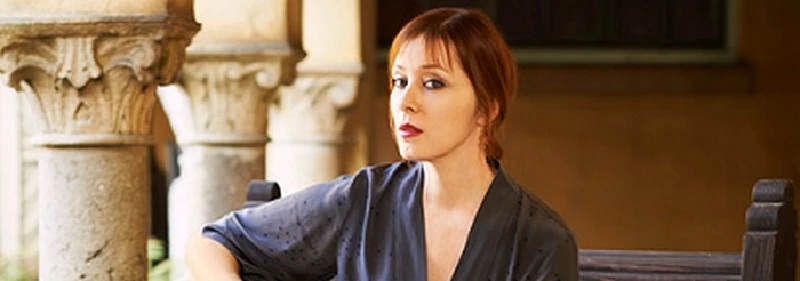

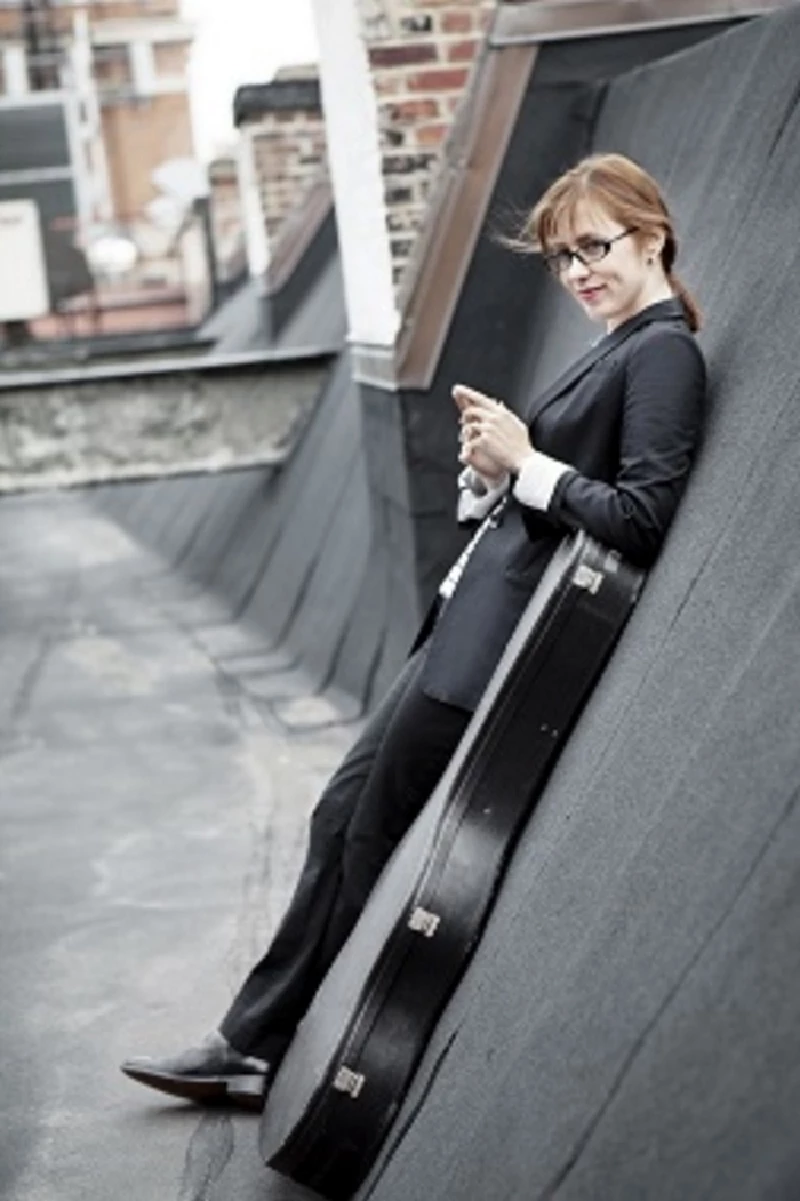
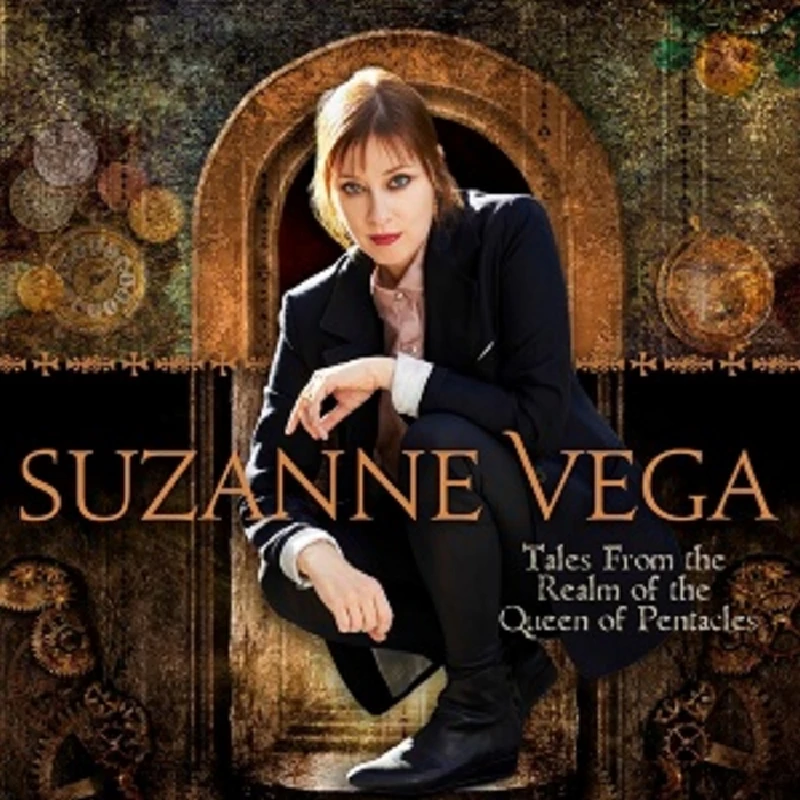
interviews |
|
Interview (2016) |
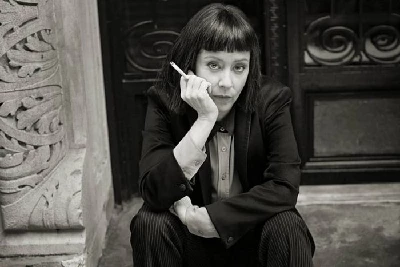
|
| Lisa Torem talks to New York singer-songwriter Suzanne Vega about author Carson McCullers, the new album which she inspired and her upcoming tour |
| Interview (2015) |
| Interview (2012) |
live reviews |
|
Old Town School of Folk Music, Chicago, 1/5/2022 |
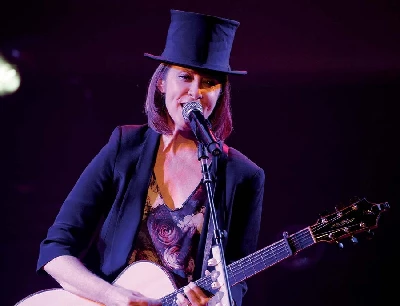
|
| Lisa Torem enjoys Suzanne Vega's much-awaited set at Chicago's Old Town School. which includes hits and selections from her one-woman show about novelist Carson McCullers. |
| S.P.A.C.E., Evanston, Illinois, 22/2/2013 |
soundcloud
reviews |
|
Flying With Angels (2025) |
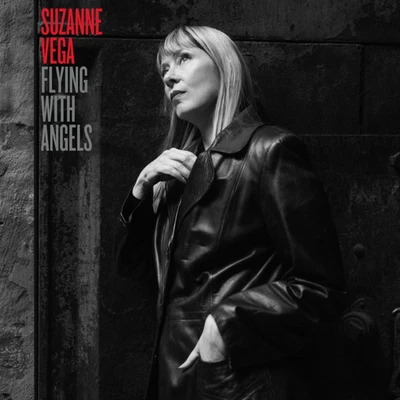
|
| Outstanding first album in nine years from Suzanne Vega which breaks new ground |
| Lover, Beloved: Songs from an Evening with Carson McCullers (2016) |
| Close-Up, Vol. 1-Love Songs (2010) |
most viewed articles
current edition
Carl Ewens - David Bowie 1964 to 1982 On Track: Every Album, Every SongArmory Show - Interview with Richard Jobson
Bathers - Photoscapes 1
Colin Blunstone - Thalia Hall, Chicago, 16/7/2025
Visor Fest - Valencia, Spain, 26/9/2025...27/9/2025
Billie Eilish - O2 Arena, London, 10/7/2025
Robert Forster - Interview
Loft - Interview
John McKay - Interview
Editorial - July 2025
previous editions
Heavenly - P.U.N.K. Girl EPManic Street Preachers - (Gig of a Lifetime) Millennium Stadium, Cardiff, December 1999
Oasis - Oasis, Earl's Court, London, 1995
Trudie Myerscough-Harris - Interview
Beautiful South - Ten Songs That Made Me Love...
Pixies - Ten Songs That Made Me Love...
Prolapse - Interview
Simon Heavisides - Destiny Stopped Screaming: The Life and Times of Adrian Borland
Paul Clerehugh - Interview
Doris Brendel - Interview
most viewed reviews
current edition
Amy Macdonald - Is This What You've Been Waiting For?Sick Man of Europe - The Sick Man of Europe
Alice Cooper - The Revenge of Alice Cooper
Phew, Erika Kobayashi,, Dieter Moebius - Radium Girls
Davey Woodward - Mumbo in the Jumbo
Lucy Spraggan - Other Sides of the Moon
Blueboy - 2
Cynthia Erivo - I Forgive You
Philip Jeays - Victoria
Lapsley - I'm a Hurricane, I'm a Woman In Love
Pennyblackmusic Regular Contributors
Adrian Janes
Amanda J. Window
Andrew Twambley
Anthony Dhanendran
Benjamin Howarth
Cila Warncke
Daniel Cressey
Darren Aston
Dastardly
Dave Goodwin
Denzil Watson
Dominic B. Simpson
Eoghan Lyng
Fiona Hutchings
Harry Sherriff
Helen Tipping
Jamie Rowland
John Clarkson
Julie Cruickshank
Kimberly Bright
Lisa Torem
Maarten Schiethart